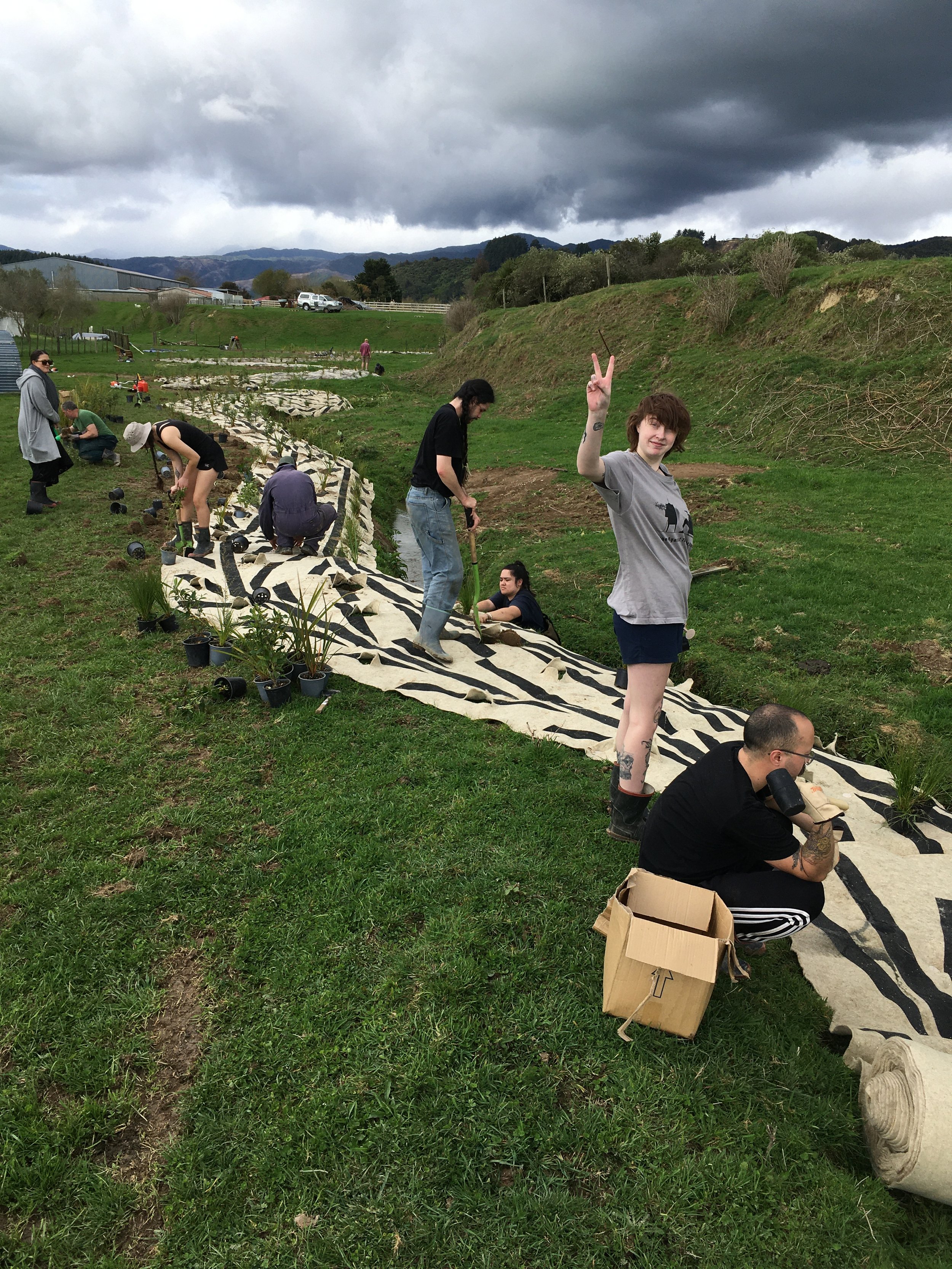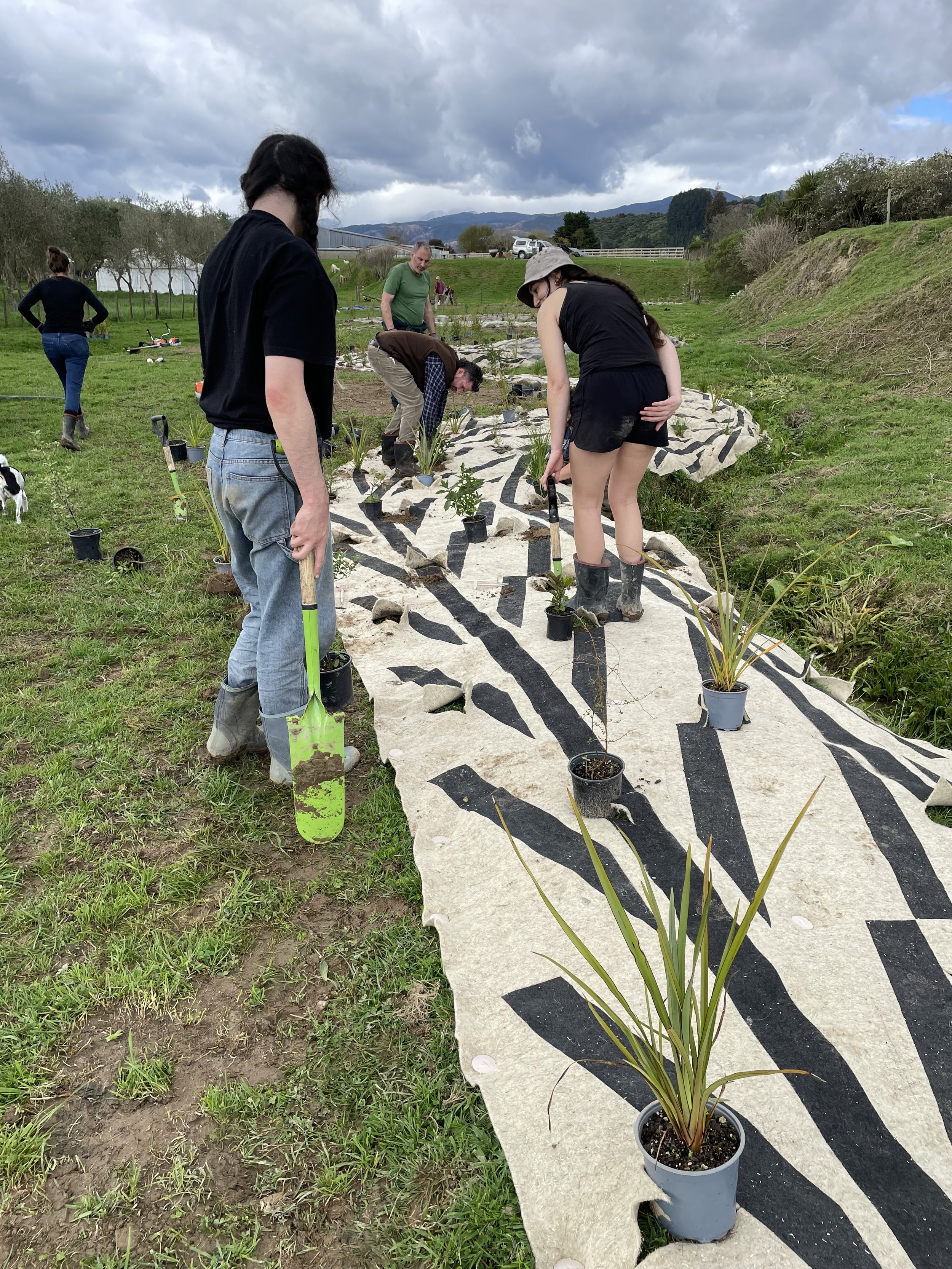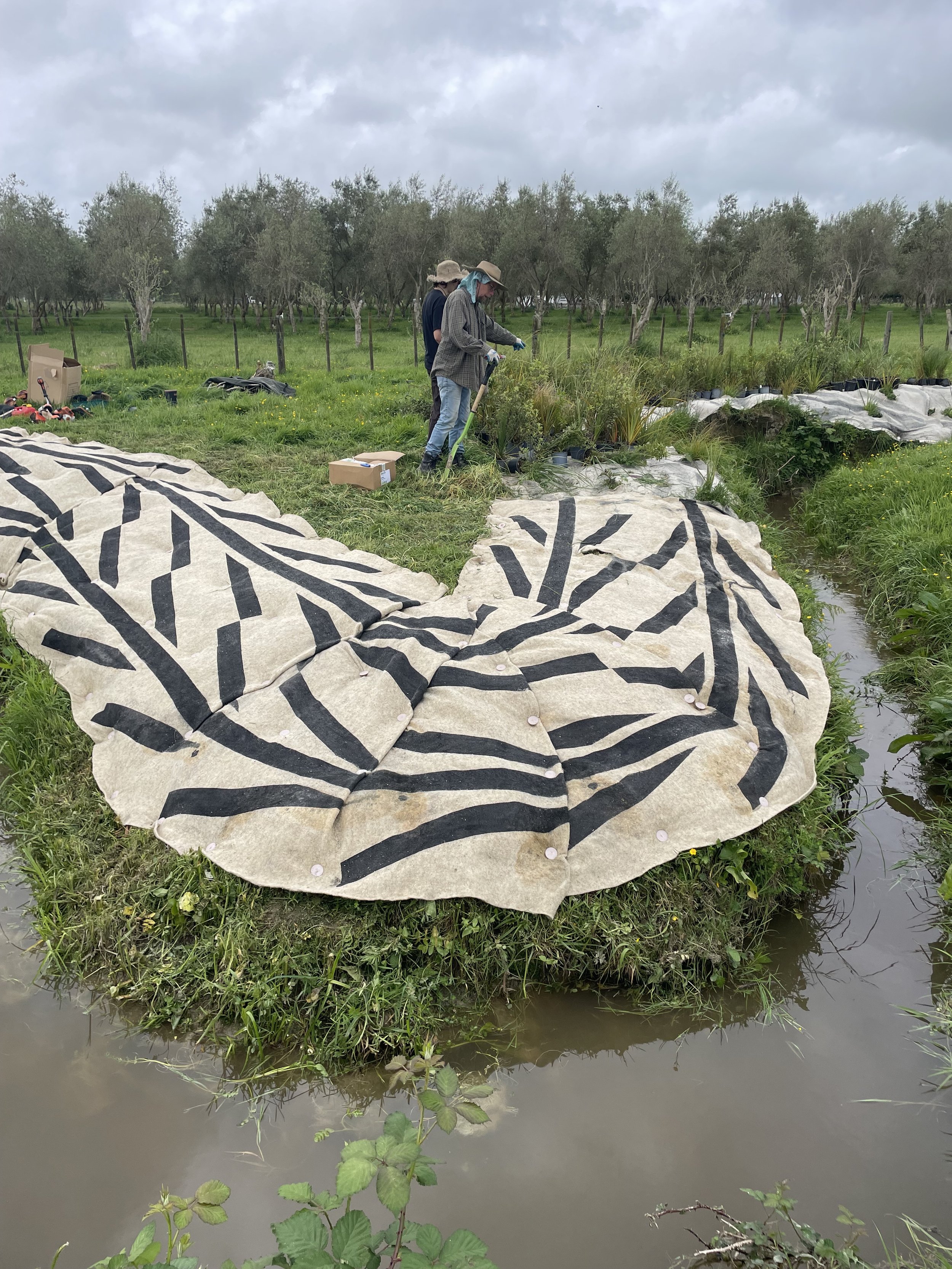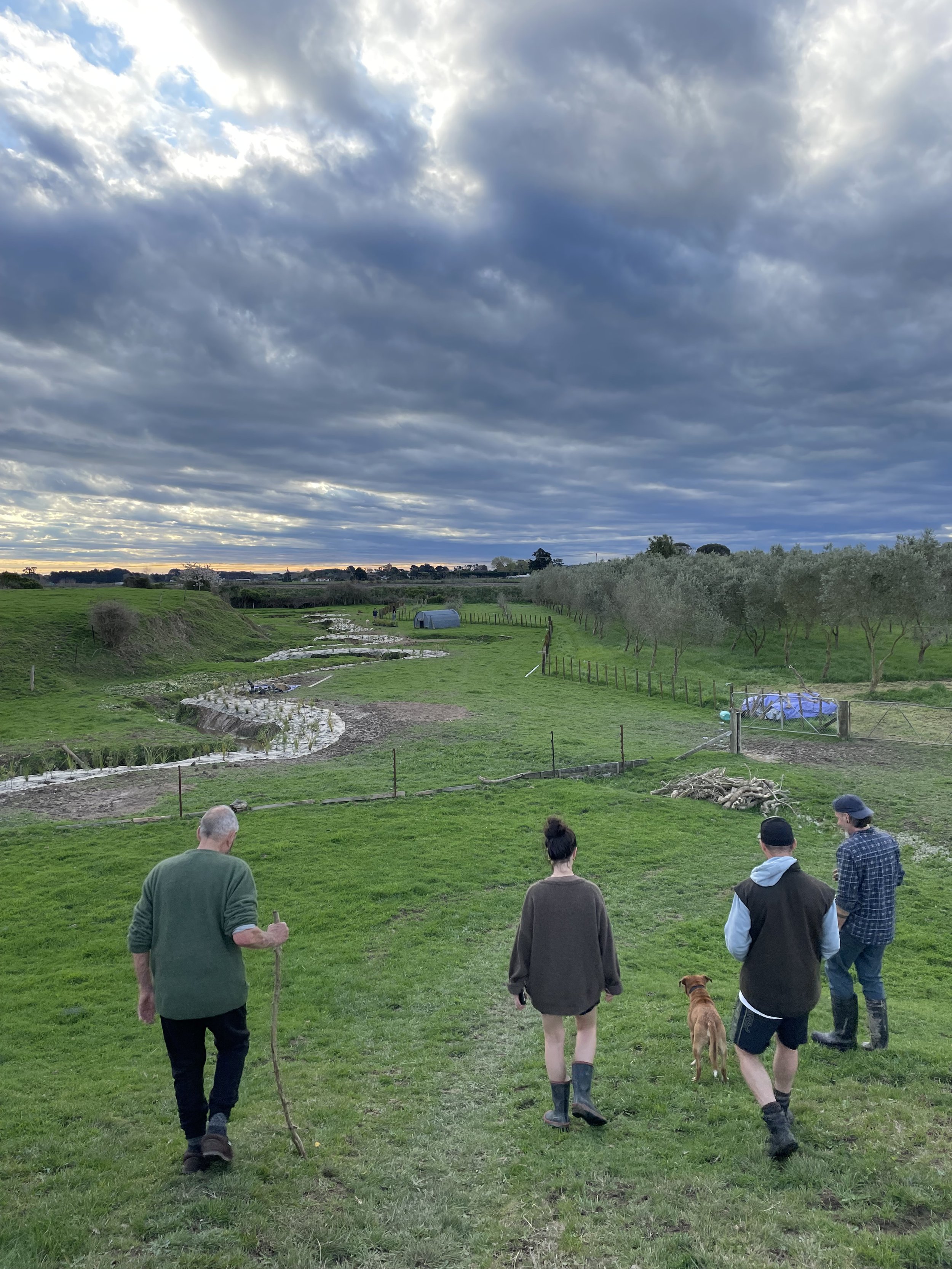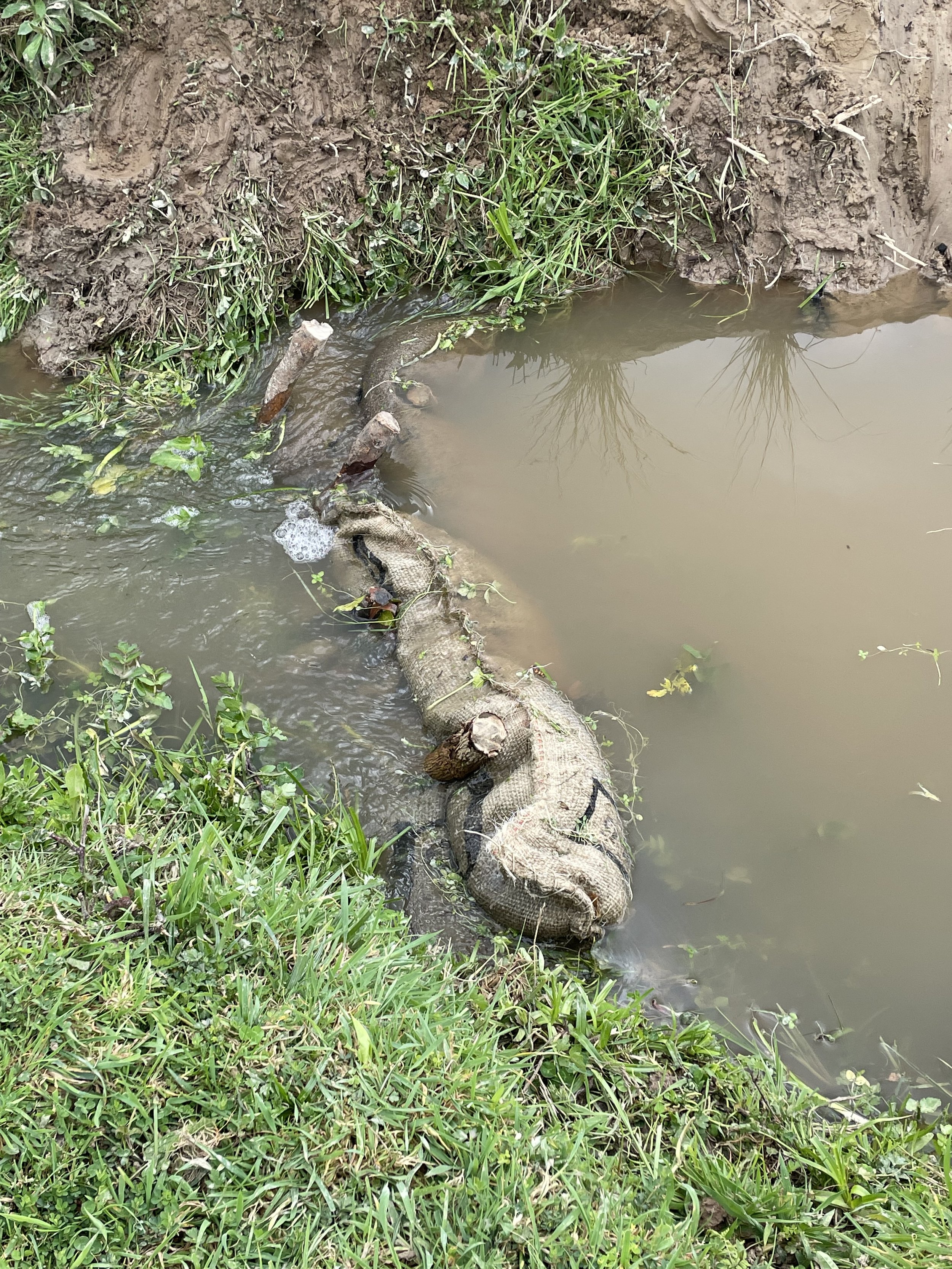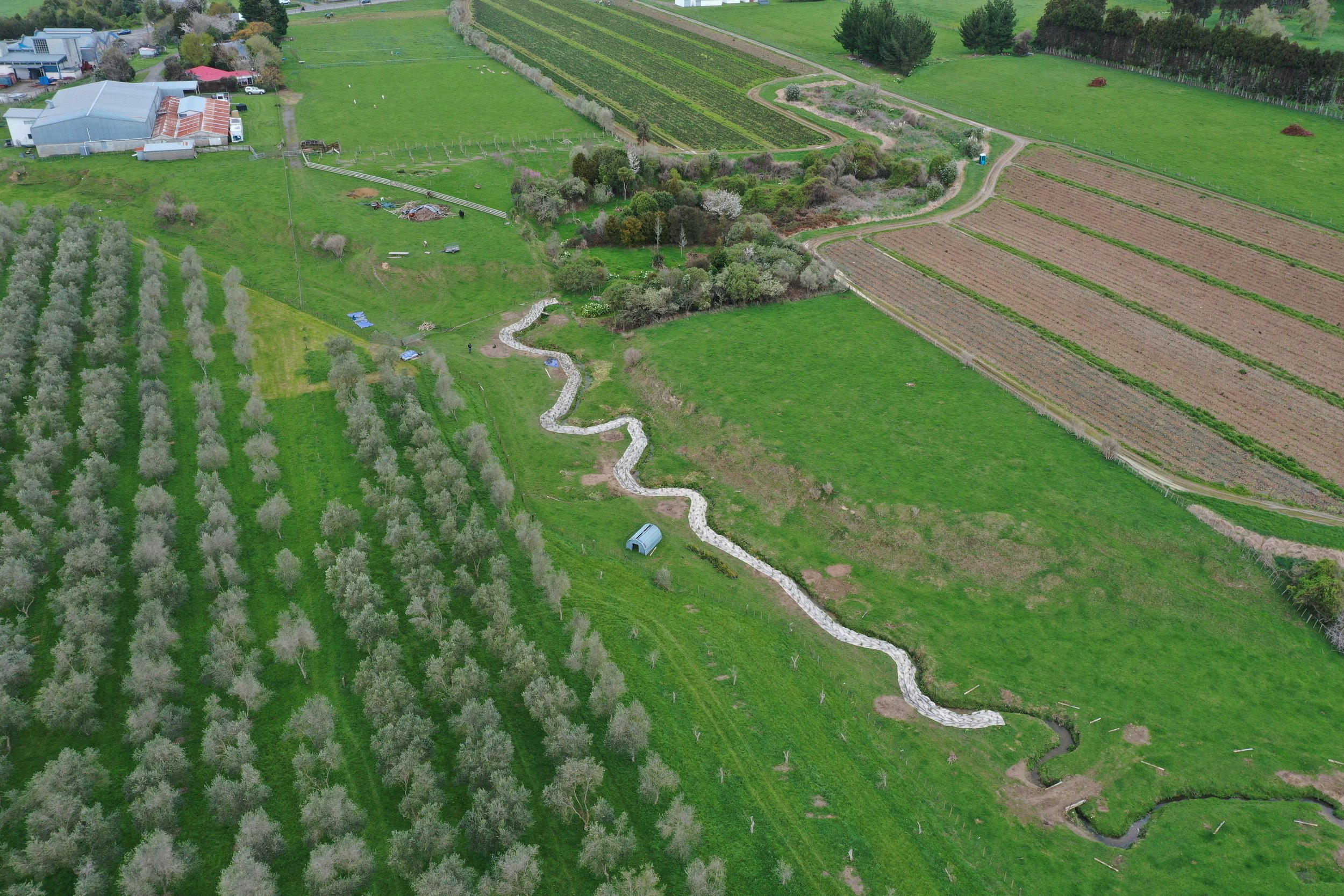THE KUKU BIOCHAR PROJECT 2021 - 2024
FINAL STREAM INSTALL, SEPTEMBER 2023 – JANUARY 2024
The genesis of The Kuku Biochar Project began all the way back in February 2019, with our first hui at Tukorehe Marae in the Horowhenua. Te Waituhi ā Nuku-Drawing Ecologies artist collective spent a week drawing, walking, talking and sharing meals and daily life. Te Waituhi ā Nuku-Drawing Ecologies is a collective of indigenous and non-indigenous artists, who are working cross-culturally alongside Ngāti Tukorehe iwi and hapū to develop climate change research to better understand how Māori communities are affected by climate change from their cultural, social, political, economic and ecological context. Through art and design strategies, the aim is to instigate ecological transformation and cultural change by using indigenous or Māori-led approaches and kaupapa Māori research methods. Under the guidance of Dr Huhana Smith we embraced Mātauranga Māori research methodologies such as whakapapa (interconnected genealogies), hīkoi (walking-talking-meetings) and korero tuku iho (local oral narratives of place).
Dr Huhana Smith
During this hui Monique Jansen, one of the artists in Te Waituhi ā Nuku - Drawing Ecologies collective, was using biochar to make drawings; and as a permaculturalist she had also been actively using biochar in her garden at home. The opportunity to develop an ecology/art project that used biochar, seemed like the perfect confluence of her drawing, permaculture and gardening practices. Through the process of several hui, a proposal to do a fresh-water stream restoration emerged. Working closely with Huhana it was proposed to continue the restoration of the degraded Waikōkopu stream on her whanau farm. So we started to think about biochar as a drawing or printing medium but also as a water filter, soil additive and its capacity for carbon sequestration, and wondering how we could create an art installation that would benefit the Waikōkopu stream? The ideas expanded to consider printing or stencilling with biochar, and it seemed the perfect coalescence to stencil images onto weedmat that could then be used in the process of revegetating the stream.
Waikōkopu stream
Waikōkopu stream
Monique and Huhana started by inviting Phil Stevens (from Slow Farm) to guide and teach the collective how to make biochar in a specially designed flame-capped biochar kiln. The first few hui were dedicated to making biochar from all the ‘waste’ wood from Huhana and Richard’s farm: using the olive prunings from the Waikōkopu olive grove and old wind-toppled fruit trees. With Phil’s guidance, Te Waituhi ā Nuku-Drawing Ecologies gathered several times; sharing food and stories while feeding the fire with dry wood over several hours, finally quenching it; culminating in gleaming piles of biochar.
The next job was to grind biochar and make a paint that we could stencil with. We designed a stencil based on the Waewae Pakura tukutuku pattern, which represents the feet of the Pukeko (swamp hen) - a bird that is commonly seen on swampy farm land around the Waikōkopu Stream. We hand cut this pattern into large sheets of plastic, eventually stencilling the image along the length of eight, 30mtr rolls of weedmatt, We chose to stencil on to a hemp & wool weedmat that we sourced from Advance Landscape Systems. This is a locally grown and highly sustainable product used to support revegetation projects.
Once stencilled, we pegged all the weedmats along the winding edges of the Waikōkopu, cloaking the last stretch of the stream, from the bottom paddock all the way down to the railway-line. With the help of an amazing crew of friends and whanau, we planted about 1000 locally sourced native plants including harakeke, mingimingi, toetoe, tī kōuka, karamu, manuka, kowhai and kohuhu, native broom, koromiko, carex secta, mahoe and matipo, on the northern side of the stream to provide shade for the awa and southern bank, which will also eventually be planted.
The second focus of the project, and a second use for the biochar, was to create leaky dams, using biochar-filled sacks. Used coffee sacks, donated by Dark Horse Coffee were filled with biochar, stitched closed and staked in the stream. Designed to slow water down and reduce flooding, while still allowing fresh water fish to move up and down the stream, leaky dams mimic the natural obstructions caused by fallen tree branches and forest debris, restoring the natural function of streams ecosystems. Charcoal is also used as a water filter, so these biochar-filled sacks will support the stream restoration by cleaning the water and slowly adjusting the stream basin into a shallower, wider, more natural shape that will support greater fresh water biodiversity and flooding mitigation.
In both projects, the aim was always to close an ecological loop and to keep resources within the farm site: the ‘waste’ wood was sourced from the olive orchard adjacent to the stream, converted to biochar in the neighbouring paddock, then returned to the stream surrounds, to eventually break down and return to the whenua from which it grew; sequestering carbon, supporting soil regeneration and improving water quality.
This has been a long and utterly rewarding project, ebbing and flowing through Covid, life-stuff and other commitments. We have been supported all the way by the amazing collective effort of Te Waituhi ā Nuku-Drawing Ecologies team. By using kaupapa Māori research methods; hui, hikoi, sharing kai and korero, Te Waituhi ā Nuku-Drawing Ecologies artist collective, has been on a journey towards intimate knowledge of place and people, over an extended period of time; making life-long connections and witnessing the restoration and healing of this whenua and awa. This project was about sparking imagination, telling a story about what is possible when a bunch of artists hang out around a fire pit and experiment with ideas, collective actions and solutions-focused art projects. We hope this project will embolden others to explore creative and collective experiments towards ecological transformation and cultural change.
Update:
The biochar pattern has slowly washed off over the last few months but the hemp weedmatt is holding out well and will remain until the trees are tall enough to shade out competing grass and weeds, eventually breaking down and further sequestering carbon into the soil. We are happy to report that the trees are growing beautifully. It has been good growing weather and the weed mat gives them the head start that they need.
Since the September install weekend, Madison Emond and Joseph Sands have laid the last of the weed mat and planted the remaining seedlings before they headed back to USA. Absolute legends! Over the 2023/2024 summer we have been actively attacking and mulching the blackberry that has recolonised the area since the goats left the paddock. Karlena Dunn (final year Integrated Design Hons student at Massey) has been experimenting with making plant material/fabric and insulation boards from this waste/weed source. We are so happy and grateful for the support and interest of this younger artistic cohort… our hope is that this project has been a starting point for further whenua/awa based ecological art projects… watch this space!
Thanks and gratitude to everyone who helped with this epic stream install….
Phil Stevens, Hayden Fowler, Moira Poutama, Julieanna Preston, Matthijs Siljee, Maria O’Toole and Glen, Chloe Mason, Maija Stevens, Matt Tini and Elena Rei, Madison Emond, Joseph Sands, Zoe Bell, Wawe Ransfield, Paul Ransfield, Tim Park, Turi Park, Richard Anderson, Caleb Anderson, James Anderson, Aroha Spinks, Carly Andersen, Haley Bell, Greg Suckling and film crew.
Thank you to ReaDi Funding (Massey University), Advance Landscape Systems, Dark Horse Coffee for funding and support.
Thanks to Govett Brewster Art Gallery for their support of this project.
*We want to add a special thank you to Phil Stevens from Slow Farm, who brought so much more to the project than just biochar – he engaged us in korero around systems thinking, land-use, permaculture, freshwater ecology and small-farm futures. An awesome human being and a pal for life. Thanks Phil!
*And a very special thank you Greg Suckling from Advance Landscape Systems who got behind this project in a big way. Thanks Greg!
RESOURCES/LINKS:
Advance Landscape Systems https://www.advancelandscape.co.nz/
Dark Horse Coffee https://darkhorsecoffee.co.nz/
Slow Farm https://slowfarm.co.nz/
NZ biochar network https://biochar.net.nz/
Govett Brewster Art Gallery https://govettbrewster.com/
LINKS:
Radio interview with Mikaela Nyman from Sugar Loaf Arts Cast, community arts podcast on Access Radio Taranaki.
https://www.accessradiotaranaki.com/shows/sugar-loafing-arts-cast/
https://accessmedia.nz/Player.aspx?eid=1f20bbee-ca09-4609-9eea-2682fd0d0f61
Listen to Dr Huhana Smith talk about the project on RNZ:
Te Au: Liquid Constituencies exhibition reviews
https://overland.org.au/2023/06/ko-wai-matou-we-are-water/
https://www.pantograph-punch.com/posts/Representing-the-Knowledge-of-Many
*FYI this series of blog posts have been reposted on the Dark Green Aotearoa website
https://www.darkgreenaotearoa.nz/latest-posts
Photos by Madison Emond, Maija Stevens, Huhana Smith and Monique Jansen
Words by Huhana and Monique

























